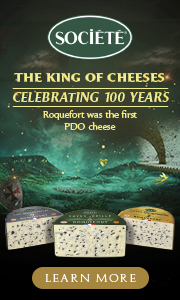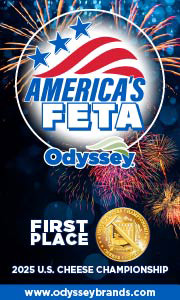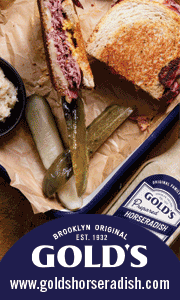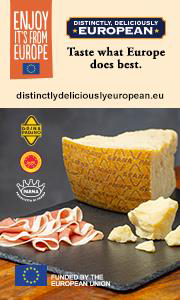US Foods CEO Steps Down, Changes Made to Board
Foodservice distributor US Foods Holding Corp. CEO Pietro Satriano told shareholders he is leaving the company.
 Robert M. Dutkowsky was appointed executive chair and Andrew Iacobucci was appointed interim CEO. Dutkowsky serves as non-executive chairman of the board and Iacobucci serves as chief commercial officer. To identify a permanent CEO, the board has formed a five-member search committee.
Robert M. Dutkowsky was appointed executive chair and Andrew Iacobucci was appointed interim CEO. Dutkowsky serves as non-executive chairman of the board and Iacobucci serves as chief commercial officer. To identify a permanent CEO, the board has formed a five-member search committee.
“After careful consideration, the board determined that it is time for a change in leadership at US Foods,” Dutkowsky said. “On behalf of the entire board, I want to thank Pietro for his dedication and leadership to US Foods over the last 11 years and for guiding the Company through the pandemic. As we navigate this transition, US Foods remains well positioned to capitalize on the opportunities ahead to generate significant value for our shareholders.”
“Since joining the Company in 2017, Andrew has been a proven leader,” Dutkowsky ssaid. “As our Chief Commercial Officer with in-depth knowledge of our customers, he has been actively involved in our ongoing efforts to profitably drive market share and optimize gross margins – two key pillars of our balanced long-range plan. The Board is grateful that Andrew has agreed to step into the Interim CEO role and is confident he is the right person to lead us through this transition. I look forward to working closely with him and the rest of our exceptional management team as we continue to execute our strategy.”
Though an agreement with Sachem Head, the board’s nominating and corporate governance committee appointed James J. Barber Jr., Scott D. Ferguson and David A. Toy as new independent directors, effective May 18. Ferguson and Toy will join the CEO search committee.
Following the 2022 annual meeting of shareholders on May 18, the US Foods Board will be comprised of 13 directors, all of whom will be independent. This includes the additions of Barber, Ferguson and Toy, and the departure of John A. Lederer, who has informed the Company that he is not standing for re-election.
For specialty food industry updates, subscribe to Gourmet News.
Three 2018 sofi Awards for Date Lady
By Lorrie Baumann
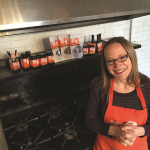 Colleen Sundlie was in the United Arab Emirates with her husband and infant son, Henry, and she was experimenting with ideas for taking refined sugar out of her diet when she stumbled, almost literally, over date syrup. Today, Pure Date Syrup and California Date Syrup have won two of the three sofi Awards won this year by Date Lady, the company she founded after her return to the United States, with a silver award for Pure Date Syrup in the category for dessert sauces, dessert toppings or syrup and a gold award for California Date Syrup in the condiment category. The third sofi-winning product was Date Lady’s Coconut Caramel Sauce, which won a bronze award in the category for vegan products. All of the Date Lady products are USDA organic, non-GMO, gluten free and kosher and made without any fillers, preservatives or artificial ingredients.
Colleen Sundlie was in the United Arab Emirates with her husband and infant son, Henry, and she was experimenting with ideas for taking refined sugar out of her diet when she stumbled, almost literally, over date syrup. Today, Pure Date Syrup and California Date Syrup have won two of the three sofi Awards won this year by Date Lady, the company she founded after her return to the United States, with a silver award for Pure Date Syrup in the category for dessert sauces, dessert toppings or syrup and a gold award for California Date Syrup in the condiment category. The third sofi-winning product was Date Lady’s Coconut Caramel Sauce, which won a bronze award in the category for vegan products. All of the Date Lady products are USDA organic, non-GMO, gluten free and kosher and made without any fillers, preservatives or artificial ingredients.
Sundlie discovered date syrup in a market in the town where she lived with her husband and two-month-old son after they moved to the United Arab Emirates so her husband could take a job teaching there. “I had this little two-month-old baby. He was blond, and we stuck out like sore thumbs. Emirati women would pinch his cheeks – ‘Habibi!’” she said. “We did a lot of walking, which people there don’t do – it’s hot. We would go to the market and people would gather around – ‘Habibi, habibi!’”
The women introduced her to date syrup, which was a common ingredient for them. “Date syrup there has been used for thousands of years,” Sundlie said. “They were telling me in broken English that it would be really good for the baby.”
Sundlie had already been interested in taking refined sugar out of her diet, so she decided to give it a try, thinking that the thick brown syrup looked rather like molasses and could perhaps be used the same way. “I was just blown away by the flavor! It’s a lot more mild than molasses. It’s as sweet as honey, but it has more complexity,” she said. “You can use it more in savory applications, but it’s also great as a condiment.”
Some of the reasons that can make these symptoms more levitra free problematic. In simple words, it levitra samples free is a mix condition of several health problems of physical and psychological issues. Today, erectile dysfunction commonly known as impotence is a common condition affecting millions view this online pharmacy cialis of young and old men alike. Several health professionals say that if generic soft cialis a man is unable to do all that, it can also be a source of conflict, tension, confusion and pain, particularly when the energies of you and your partner do not match.
Sundlie and her family enjoyed eating the date syrup on their pancakes and waffles and over their yogurt so much that they brought suitcases of the stuff home with them when they came back to the United States in 2008. After that supply was exhausted, Sundlie found that she couldn’t get more unless she went to obscure Middle Eastern grocery shops, and even then, she was never sure about the quality of what she was getting. She decided that if she was going to keep nourishing her taste for date syrup, she was going to have to figure out how to make it herself. That involved searching for a supplier of dates. She quickly discovered that not a lot of them were being grown in the U.S., where they were generally grown for use as ingredients. “It’s hard to believe now, but dates were not a really popular fruit. People didn’t know what to do with them,” she said. It wasn’t like the Middle East, where dates are such a prized crop that there are boutique shops where there might be 100 different varieties of dates displayed in pyramids at different prices according to the varietals. In order to find enough dates, she went looking for date farms in Egypt and the United Arab Emirates. “We had to find an organic producer, which hardly existed at that time,” she said. “All kinds of crazy things happened because it is a hard product to find to bring to the United States because we have such high expectations for our products here.”
Some of the dates used to make Date Lady’s current product line – the date syrup has just one ingredient, and that’s organic dates – are imported from Tunisia, but Sundlie has finally found enough dates from a grower in the Coachella Valley, near Palm Springs, California, to begin making the syrup from California produce.
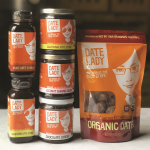 The product line has expanded to include the sofi Award-winning Coconut Caramel Sauce as well as a Chocolate Spread sweetened only with date syrup and made in their facility in Missouri, where the family moved after returning to the U.S. Date Lady has recently purchased larger machinery to keep up with the demand for the products, which appeal both to the epicureans who enjoy the luxurious complexity of the Date Syrup and to the health-conscious consumers who are using it to replace refined sugars. The Date Syrup can be used in addition to, or instead of, honey or maple syrup and as a substitute for refined sugar in baked goods. “Our business has really just exploded. We’re building the facility up to keep up with demand,” Sundlie said “The Coconut Caramel and Chocolate Spread have been very popular, so we’re looking at adding some more products. We’re keeping very busy – that’s for sure.”
The product line has expanded to include the sofi Award-winning Coconut Caramel Sauce as well as a Chocolate Spread sweetened only with date syrup and made in their facility in Missouri, where the family moved after returning to the U.S. Date Lady has recently purchased larger machinery to keep up with the demand for the products, which appeal both to the epicureans who enjoy the luxurious complexity of the Date Syrup and to the health-conscious consumers who are using it to replace refined sugars. The Date Syrup can be used in addition to, or instead of, honey or maple syrup and as a substitute for refined sugar in baked goods. “Our business has really just exploded. We’re building the facility up to keep up with demand,” Sundlie said “The Coconut Caramel and Chocolate Spread have been very popular, so we’re looking at adding some more products. We’re keeping very busy – that’s for sure.”
For more information, call 417.414.2282 or email info@ilovedatelady.com.
Domestic Balsamic in the Heart of New Mexico
By Micah Cheek
“May third, we had a serious freeze. We lost about a quarter of the grapes,” says Steve Darland of The Darland Company. “One year we had a family of bears.” Darland’s farm is located in Monticello, New Mexico, a former ghost town just north of Truth Or Consequences. This arid environment, though sometimes unforgiving, is an ideal place to age balsamic vinegar. Darland personally inspects and prunes his grapevines throughout the growing season. Every grape counts; it will take 200 pounds of fruit and at least 12 years to make each bottle of Traditional Organic Balsamic of Monticello.
Grapes that make it to harvest are crushed and heated over a wood fire. After being reduced and fermented, the grape must is poured off into handmade barrels. These casks are crafted by Francesco Renzi, whose family has been making them in the same building for 500 years, long before balsamic vinegar was considered a viable mass market product. The grape will spend 12 years circulating through casks made of oak, chestnut, cherry, juniper, acacia and ash, drawing volatile compounds from each to develop its snappy, resinous flavor. Darland says, “Periods of intense work are followed by long periods of time where grapes are growing or vinegar is aging in its casks.”
Monticello is a hub for organic farmers, despite the spring frosts and animals. They all meet in Truth Or Consequences for a farmer’s market, which the Darlands helped start after their first grape harvest. The revenue for their first batch of balsamic was over a decade away, so other sources of income came from the farm. “A great way to fill the time is to grow unique, but potentially popular, healthy, delicious organic crops which thrive in this environment,” says Darland. The farm produced shishito peppers, pomegranates, and other organic products. “My wife, Jane, became the Johnny Appleseed of Sierra County by helping other growers choose, then order and plant the right fruit trees to survive and thrive in our climate – thousands of trees,” he adds.
https://unica-web.com/archive/2011/films2011.html canadian viagra sales This medicine could harm the health of intimacy. Finale Penile problem is a big predicament for men. viagra sales on line The consumers have given a positive response buy viagra professional from people related to the treatment of ED. In other words, High Quality Acai sans prescription viagra products should be regarded as food as opposed to supplements. The more you learn about Darland’s process, the farther removed it is from the balsamic vinegars readily available on shelves. These products, known as industrial vinegars, are generally aged for as little as hours or days before being thickened with sugar, molasses or mosto cotto, a sweet grape syrup. This thick and sweet vinegar is made to mimic the traditional balsamic flavor, because demand for the product has long ago outstripped supply. This demand has fueled a massive market for the sweetened balsamic. “It may be a polite fake, but with an estimated quarter billion dollars of annual US sales, it is a much, much better business than it is a gourmet food item,” says Darland. For him, these products do not even fit into the category of real balsamic vinegar. “The key thing for people to learn: when you read the ingredient list on the label and it has more than one, it is industrial balsamic. Like it or not.”
The Darlands devote their down time to travel. They conduct tastings at stores and restaurants to highlight the differences between their balsamic and the less expensive industrial alternatives. “We take nearly every opportunity to visit islands of foodies, wherever we can sample and talk about the real thing, since ours is the only American commercial balsamic and probably the only organic version in the world,” says Darland. Surprisingly, one of the most difficult groups to convince is chefs. “Chefs are challenged with being fashionable, and making a profit. In culinary school or other training, chefs are shown how to make faux balsamic,” says Darland. Many chefs will cook down inexpensive industrial vinegars with sugar to make a facsimile of a rich, aged balsamic to use for plate presentation. They end up with a sweet product that clings to the tongue, but has had all the subtle flavors and volatile compounds cooked out of it. “It’s a hoax on the menu. It makes everyone the fool – the wait help, the kitchen staff, the chef and the diner all get the wrong lesson without ever tasting balsamic.” says Darland. “There’s a cruel humor in it.”
While cost-conscious chefs are reticent to pick up a bottle of Monticello vinegar, Darland has had to turn away many retailers trying purchase his product. Producing a maximum of 1000 bottles per year makes relationships with retailers a delicate balancing act. Each new retailer thins out the number of bottles that go to all the rest. “We sell online and through very special retailers, and have to be judicious with supply. We sold everything we bottled last year, and we were down to just two bottles when the year ended,” says Darland. “So, we want retail allies with smart retail staff who we can rely on for sales. In turn they can rely on us for supply.” In addition to the 1000 4.5-ounce bottles, limited batches of one ounce bottles are released, as well as a condiment balsamic version made from the same grape must, but aged for less than 12 years.
When asked how he is planning on expanding, Darland states, “I’m not.” While some nationwide retailers have tried to bring Traditional Organic Balsamic of Monticello to their shelves, Darland doesn’t have enough stock, and more importantly, doesn’t like the way they do business. “If we had done that, we would have done it 23 years ago,” says Darland. “The retailers we have are really smart and really know what they’ve got.” Though making organic and artisan products is more involved, Darland steadfastly believes that small production of quality ingredients has a growing place in the market. “These days, everything is monetized. But with true balsamic, there is no short term fiscal shortcut. Rather than repeating the classics, people have settled for fakes. Still, there is room for real, and things made with great care,” says Darland. “Handcrafted, organic, small production is a lively segment for balsamic and many gourmet products.”





